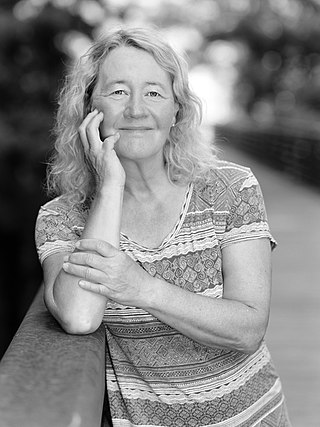
Walter Gilbert is an American biochemist, physicist, molecular biology pioneer, and Nobel laureate.

Acid alpha-glucosidase, also called α-1,4-glucosidase and acid maltase, is an enzyme that helps to break down glycogen in the lysosome. It is functionally similar to glycogen debranching enzyme, but is on a different chromosome, processed differently by the cell and is located in the lysosome rather than the cytosol. In humans, it is encoded by the GAA gene. Errors in this gene cause glycogen storage disease type II.

Beta-hexosaminidase subunit beta is an enzyme that in humans is encoded by the HEXB gene.

Michael Grunstein is a Distinguished Professor Emeritus of Biological Chemistry at the David Geffen School of Medicine at UCLA.

Rebecca Craighill Lancefield was a prominent American microbiologist. She joined the Rockefeller Institute for Medical Research in New York in 1918, and was associated with that institute throughout her long and outstanding career. Her bibliography comprises more than 50 publications published over 60 years.

Carolyn Widney Greider is an American molecular biologist and Nobel laureate. She joined the University of California, Santa Cruz as a Distinguished Professor in the department of molecular, cell, and developmental biology in October 2020.

Carolyn Ruth Bertozzi is an American chemist and Nobel laureate, known for her wide-ranging work spanning both chemistry and biology. She coined the term "bioorthogonal chemistry" for chemical reactions compatible with living systems. Her recent efforts include synthesis of chemical tools to study cell surface sugars called glycans and how they affect diseases such as cancer, inflammation, and viral infections like COVID-19. At Stanford University, she holds the Anne T. and Robert M. Bass Professorship in the School of Humanities and Sciences. Bertozzi is also an Investigator at the Howard Hughes Medical Institute (HHMI) and is the former director of the Molecular Foundry, a nanoscience research center at Lawrence Berkeley National Laboratory.

David S. Eisenberg is an American biochemist and biophysicist best known for his contributions to structural biology and computational molecular biology, a professor at the University of California, Los Angeles since the early 1970s and director of the UCLA-DOE Institute for Genomics & Proteomics since the early 1990s, as well as a member of the California NanoSystems Institute (CNSI) at UCLA.
Laura Lee Kiessling is an American chemist and the Novartis Professor of Chemistry at the Massachusetts Institute of Technology. Kiessling's research focuses on elucidating and exploiting interactions on the cell surface, especially those mediated by proteins binding to carbohydrates. Multivalent protein-carbohydrate interactions play roles in cell-cell recognition and signal transduction. Understanding and manipulating these interactions provides tools to study biological processes and design therapeutic treatments. Kiessling's interdisciplinary research combines organic synthesis, polymer chemistry, structural biology, and molecular and cell biology.
Emil Kakkis is an American medical geneticist known for his work to develop treatments for ultra rare disorders. He is the Founder of the Everylife Foundation for Rare Disease and Founder, CEO and President of Ultragenyx Pharmaceutical Inc.

Mary Elizabeth Hatten is the Frederick P. Rose Professor of neuroscience at the Rockefeller University, where she became the first female full professor in 1992. She studies the manner in which neurons migrate in the brain, which has implications for many neurological diseases, as well as cancer. Her research led to her being elected to the National Academy of Sciences in 2017.
Daria J Hazuda is a biochemist known for discovering the first HIV Integrase Strand Transfer Inhibitors (InSTIs) and leading the development of the first HIV integrase inhibitor to gain FDA approval, Isentress (raltegravir). Her lab also determined these inhibitors' mechanism of action and ways the virus could develop resistance to them. Hazuda has also performed extensive research and led the development of antivirals for Hepatitis C Virus (HCV) including Elbasvir and Grazoprevir. She currently serves as Vice President for Infectious Diseases Discovery for Merck and Chief Scientific Officer of their MRL Cambridge Exploratory Science Center.
Patricia Jean Johnson is a Professor of Microbiology at University of California, Los Angeles (UCLA). She works on the parasite Trichomonas vaginalis, which is responsible for the most prevalent sexually transmitted infections in the United States, Trichomoniasis. She was elected a member of the National Academy of Sciences (NAS) in 2019.
Sabeeha Sabanali Merchant is a professor of plant biology at the University of California, Berkeley. She studies the photosynthetic metabolism and metalloenzymes In 2010 Merchant led the team that sequenced the Chlamydomonas genome. She was elected a member of the National Academy of Sciences in 2012.
Barbara Imperiali is a Professor of Biology and Chemistry at Massachusetts Institute of Technology and Affiliate Member of the Broad Institute. She is an elected member of the National Academy of Sciences and a Fellow of the Royal Society of Chemistry.
Nicola Lucia B. Pohl is an American chemist who is the Joan & Marvin Carmack Chair at Indiana University Bloomington. She also serves as Associate Dean of Natural and Mathematical Sciences. Her research considers new approaches to make and analyse sugars. In 2020 she was elected a Fellow of the American Association for the Advancement of Science.
Elizabeth Villa is an American biophysicist who is Associate Professor at the University of California, San Diego. Her research considers the development of Cryo Electron Tomography and structural biology. She was named a Howard Hughes Medical Institute Research Investigator in 2021.

Rosalind Hauk Kornfeld (1935–2007) was a scientist at Washington University in St. Louis known for her research determining the structure and formation of oligosaccharides. The Society of Glycobiology annually awards a lifetime achievement award in her honor.
Sohini Ramachandran is professor at Brown University known for her work in evolutionary biology and population genetics.

Bettie Sue Siler Masters is an adjunct professor at Duke University known for her work on nitric oxide synthase and cytochrome P450 reductase. She was the 1992 recipient of the FASEB Excellence in Science Award, and has been elected as a member of the National Academy of Medicine and as a fellow of the American Association for the Advancement of Science.











